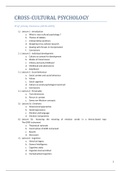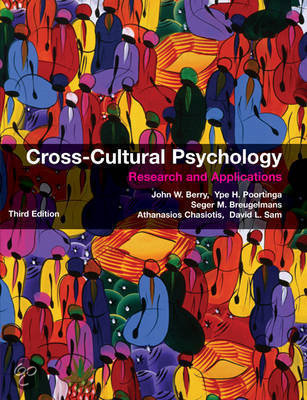CROSS-CULTURAL PSYCHOLOGY
Prof. Johnny Fontaine (2018-2019)
1.) Lecture 1 : Introduction
a. What is cross-cultural psychology ?
b. Themes of debate
c. Interpretative positions
d. Designing cross-cultural research
e. Dealing with threats in interpretation
f. Conclusions
2.) Lecture 2 : Individual development
a. Culture as context for development
b. Modes of transmission
c. Infancy and early childhood
d. Childhood and adolescence
e. Adulthood
3.) Lecture 3 : Social behaviour
a. Social context and social behaviour
b. Values
c. Social cognition
d. Culture as social psychological construct
e. Conclusions
4.) Lecture 4 : Personality
a. Trait dimensions
b. Person in context
c. Some non-Western concepts
5.) Lecture 5a : Emotions
a. Dimensional approaches
b. Facial Expressions
c. Emotion and language
d. Emotion Components
6.) Lecture 5b : Assessing the meaning of emotion words in a theory-based way:
The GRID instrument
a. Theoretical rationale
b. Construction of GRID instrument
c. Results
d. Discussion
7.) Lecture 6 : Cognition
a. Historical legacy
b. General intelligence
c. Cognitive styles
d. Cognition East and West
e. Contextualized cognition
1
, f. Conclusions
8.) Lecture 7 : Language
a.) Linguistic relativity
a. Coding and categorization of colour
b. Spatial orientation
b.) Universality in language
9.) Lecture 8 : Contributions of cultural anthropology
a. Conceptions of culture
b. Ethnography
c. Cognitive anthropology
d. Religion
e. Conclusions
10.) Lecture 9 : Challenges for Cross-Cultural Psychology (Ype H. Poortinga – Guest lecture)
a. A key issue: Conceptualization of “culture”
b. Group differences vs invariance
c. Differences as method artefacts
d. Asking multiple questions as a way forward
e. Conclusions
11.) Lecture 10: Acculturation (12/5/2019)
a. Definitions and framework
b. Theoretical models and perspectives
c. Acculturation processes
d. Acculturation outcomes
e. Methodological issues
f. Conclusions
12) Lecture 10bis: Intercultural relations (13/5/2019)
a. Intercultural strategies
b. Multiculturalism
c. Central theories: Contact theory, Ethnocentrism theory
d. Key concepts: Stereotypes, Prejudice, Discrimination
e. Conclusion
Exam
- Written closed-book exam
- Only what is treated during the lectures
- Four open questions
- Focus on insight
- Only need to know these names: Kluckhohn & hofs, Hofstede, Schwartz, Inglehart,
Triandis, Markus & Kitayama, Eysenck, Cole, Osgood, Ekman, Sapir, Whorf.
2
,LECTURE 1 – 11/2/2019 – Introduction
What is cross-cultural psychology?
- Definitions
o “Cross-cultural research in psychology is the explicit, systematic comparison of
psychological variables under different cultural conditions in order to specify the
antecedents and processes that mediate the emergence of behaviour differences”
(Eckensberger, 1972, p. 100)
o “Cross-cultural psychology is the empirical study of members of various culture
groups who have had different experiences that lead to predictable and significant
differences in behaviour. In the majority of such studies, the groups under study
speak different languages and are governed by different political units” (Brislin,
Lonner, & Thorndike, 1973, p. 5).
‘Political units’ has more come to the background within the last years. (Few
decennia ago: capital West, communist East)
o “Cross-cultural research is any type of research on human behaviour that compares
behaviour of interest across two or more cultures” (Matsumoto, 1996, p. 5).
o “Cultural psychology [is] the study of the culture’s role in the mental life of human
beings” (Cole, 1996, p. 1).
!! Shift: ‘cultural psychology’ instead of ‘cross-cultural psychology’
o Cultural psychology “has a distinctive subject matter (psychological diversity, rather
than psychological uniformity): it aims to reassess the uniformitarian principle of
psychic unity and develop a credible theory of psychological pluralism” Shweder, 2007,
p. 827).
Differences can differ to quantitative differences, but also the psychological
processes can be different (qualitative)
- Culture is central to all definitions
- Preliminary: culture = “the shared way of life of a group of people”
- Different aspects:
o Cause-consequent relations
o Cultural experiences
o Comparisons between cultures
o Mutual interactions between culture and behaviour
o Differences in psychological functions and processes
- Limited attention for:
o Uniformity (not only diversity)
Cross-cultural psychology wouldn’t exist if there were no differences
between cultures, but often the similarities are forgotten!
o Biological and ecological aspects
Biological = evolutionary aspect
Ecological = climate zone effects the way we function
o Cross-national approaches and minorities: ethnocultural groups
Minorities (within one country there are different cultural groups, we should
also take their effects into account)
o Change
3
, Vb: being gay today vs. being gay 20 years ago
More comprehensive definition
- “Cross-cultural psychology is the study: of similarities and differences in individual
psychological functioning in various cultural and ethnocultural groups; of ongoing changes in
variables reflecting such functioning, and of the relationships of psychological variables with
socio-cultural, ecological and biological variables”
o Psychology: looks at individual psychological functioning
Aims of cross-cultural psychology
o Transport and test
Develop tests, translate the tests so we can use them in other countries
problematic
o Exploring cross-cultural differences
Look at differences in the countries themselves
o Developing a (quasi-) universal psychology
o Behaviour change through psychological interventions in other cultural contexts
Apply insights Huge difference with the first 3 aims
Vb: you can’t just translate a test and apply it in another country, you need
to be aware of the differences in that country/culture
Ethnocentrism
- Ethnocentrism as (quasi-) universal characteristic of intergroup relations
- Value neutral position has been advocated, but
o Often implicit and automatic
Most people will value their society better than other societies.
o Not noticing shifts in meaning
Boeren in België vs. Azië Onbeleefd vs. beleefd
o Affects theory development
Differences in theory development when you vb. think assertiveness is good
vs. bad
o Affects research topics
ETHNOCENTRISM = A TREATH WE NEED TO FIGHT
Themes of debate
Theme 1: Culture as internal or external to the person
- External: climate, subsistence mode, political organization, affluence, schooling, …
- Internal: ideas, values, beliefs, philosophies, … (social environment becomes internalized)
Both in anthropology and in cross-cultural psychology a shift can be observed from an
external to an internal approach
o Conformity is higher in agricultural societies.
o Affluence correlates (.80) with individualism vs. collectivism
Theme 2: Relativism-Universalism
- E.g., words for colours and colour perception
4





